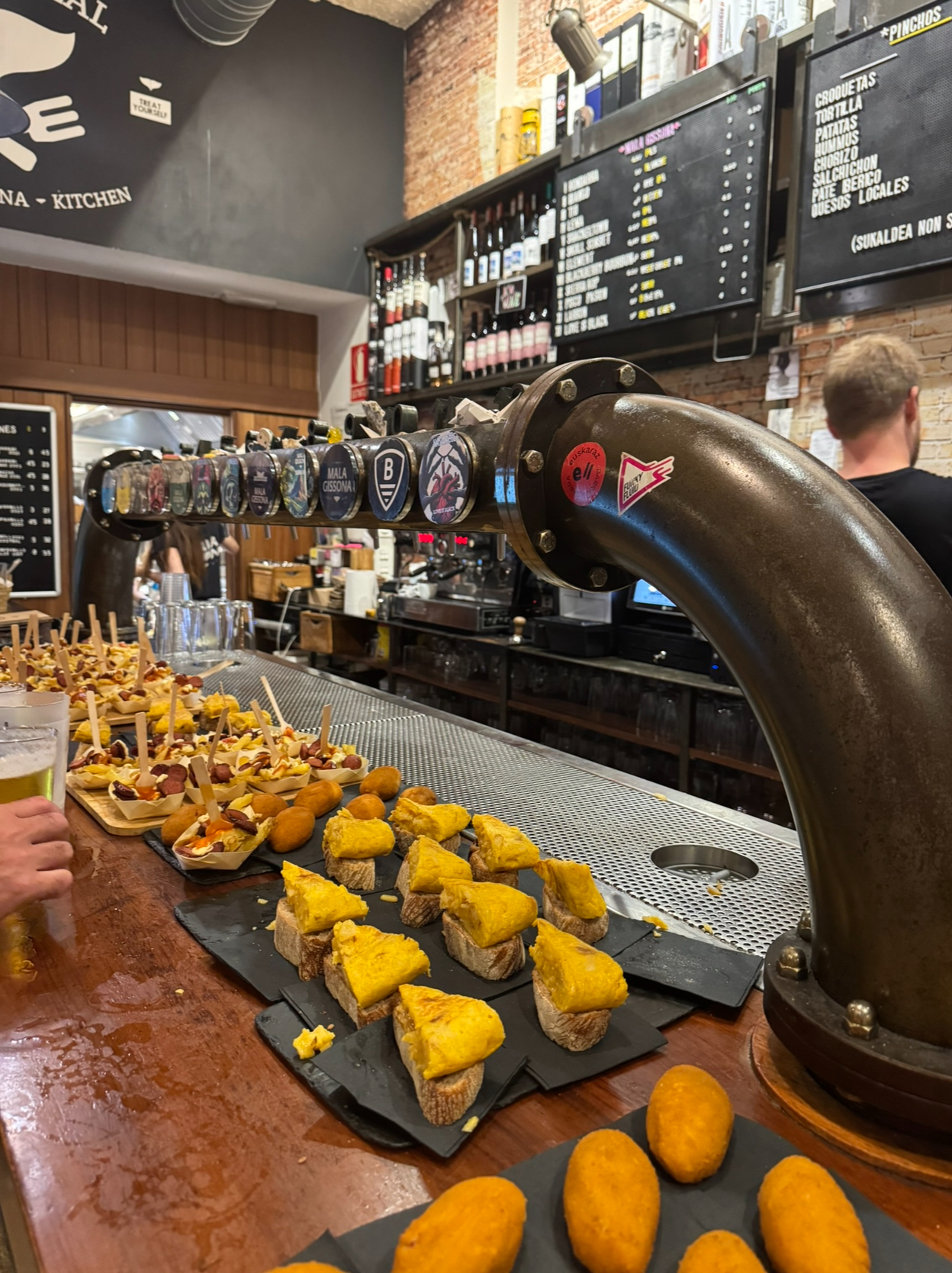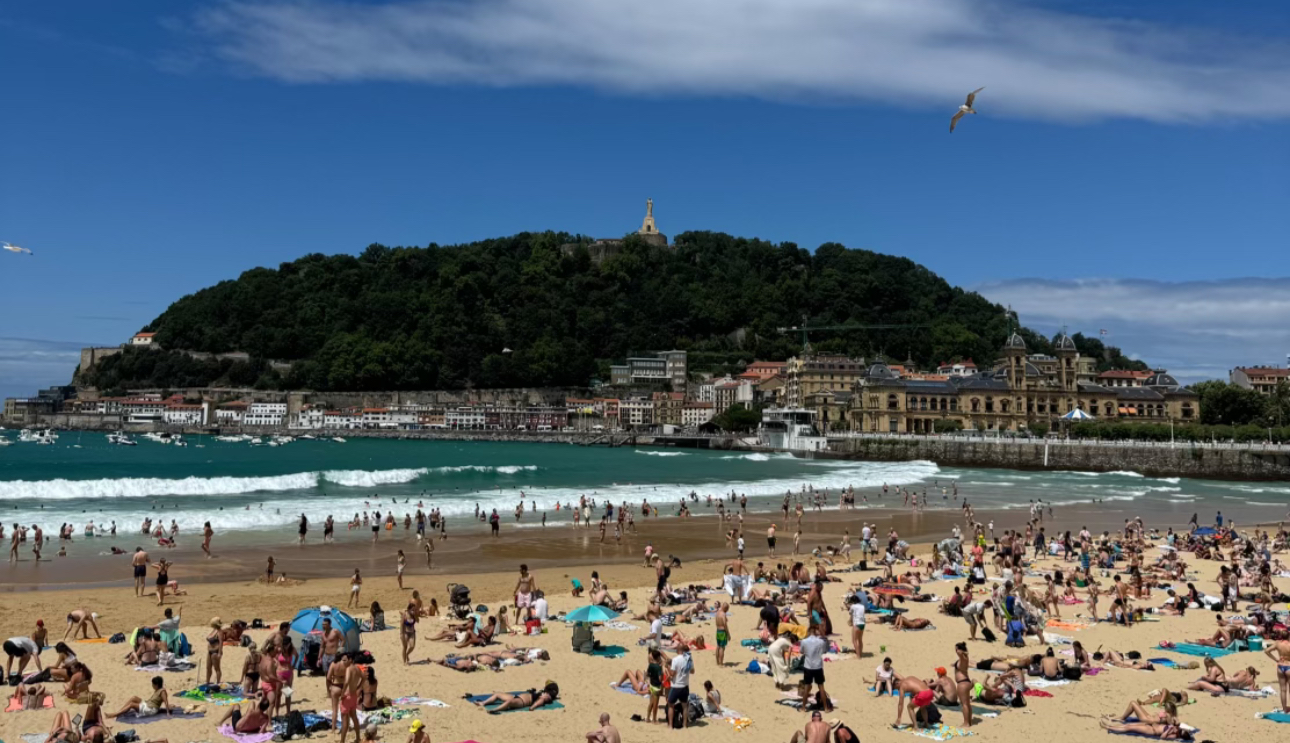The Basque culture and cuisine found in San Sebastián is one of the most sacred treasures in the world, only more recently gaining the attention and recognition it deserves worldwide. As a study abroad student exploring my first few days in this culturally rich city and Europe, I can only vouch for how enchanting San Sebastián’s food, people, language, architecture, and atmosphere has been during my first week here. Each day I navigate the streets and beaches, a new adventure begins. Adventures filled with learning a new word in Euskara, the Basque Country’s ancient language, or becoming more familiar with another alley in Parte Vieja while diving into pintxo culture. San Sebastián is the food mecca of the Basque Country and debatably Europe, as their culture and lifestyle dates back centuries and centers around traditions of cooking, eating, and socializing around food. I’ve experienced these traditions first hand as I’ve been exploring this city but was initially introduced before my trip after reading both of Marti Buckley’s cook books: Basque Country: A Culinary Journey Through a Food Lover’s Paradise and The Book of Pintxos: Discover the Legendary Small Bites of Basque Country. I’ve been blessed with the opportunity of meeting and interviewing Marti Buckley and getting to know more about her story of navigating the Basque Country and San Sebastián, similar to myself.

Meeting Marti and her Journey
Marti Buckley is an Alabama native author and an active freelance and marketing journalist still living in San Sebastián today, along with her two daughters. Her journey began as an eager college student trying to find her way through university, not entirely sure what her future would look like. A life changing opportunity to study abroad in Pamplona, Spain introduced her to Basque culture and ignited an internal passion to study more about this region which opened the doors of journalism in her life. After returning to the US, she continued her new found interest in journalism, had her first daughter at 23 years old, and began her culinary journey working by learning how to cook professionally in a kitchen for two years. Marti spoke about how ever since her study abroad experience ended, she’d been drawn to revisit Spain for years but was too consumed focusing on her family and career. Despite adversity from family and friends, she picked up her life, family, and love for the Basque country and moved to San Sebastián at the age of 26.
Marti’s first year in San Sebastián was filled with ups and downs as she slowly became accustomed to the different pace of life and began to build relationships with the locals and other families while raising her daughter. Marti talked about how it was difficult to become a part of social circles, especially since Basque social life is founded on the idea of tight knit communities of friends and family. Her breakthrough into these social communities came by a Basque friend inviting her to a traditional alubiada or bean party where she had one of her first memories experiencing the deep connection food had with Basque socialization.
Her appreciation for Basque culture only grew the longer she lived in San Sebastián and eventually inspired her idea to write her first cookbook because she wanted the world to learn about this fascinating culture. She decided to write a cookbook with the goal to get any person from anywhere in the world to learn about and appreciate Basque history to be able to replicate recipes authentically. Basque Country emphasized the importance of Basque identity and tradition demonstrated through the simple yet intentional harvesting, preparation, cooking, and serving of all Basque dishes. The Basque people take pride in the authenticity and fresh ingredients used in all of their dishes, from a simple pintxo to local wines to more intricate dishes. So far I’ve also had a wonderful experience with the food here in San Sebastián. There are so many flavor profiles and ingredient combinations I would have never considered trying and many are amazing, bold flavors made with only a handful of items.
Pintxos and the Art of Pintxo Pote
I asked Marti what Basque dish truly made her fall in love with Basque food and she swiftly answered, “The pintxo” as well a squid ink dish from Espiga. An answer I was not surprised to hear as it is also the type of dish I was most excited about trying. The Basque country is the home and creator of Pintxos. They can be as simple as a small piece of bread, olive oil, and tomato spread and as complex as grilled Iberian filet mignon or mushroom and prawn risotto. These small and relatively cheap dishes, varying from €2-5, are designed with the intention of being eaten in only a few bites. Pintxos aren’t just quick appetizers you find in bars, they are the cornerstone of bar hopping culture across Basque cities like San Sebastián and Bilbao.

Bar hopping or Pintxo Pote is the idea where friends and family get together to socialize, elbow to elbow with locals at pintxo bars. The tradition is to get a pintxo and a drink then socialize and move on to the next bar and repeat the fun. The night after meeting with Marti, my friends and I decided to take part in Pintxo Pote in the town of Gros in San Sebastián. We tried all sorts of pintxos from jamon and queso croquettas to tortilla de patatas (Spanish Omelette) over bread, one of the classics Marti mentioned were one of her favorites, as well as mine as I enjoyed a slice of Spanish Omelette with a cup of coffee each morning before language class at Lacunza. One of my favorite pintxo bars is Mesón Portaletas located in Parte Vieja where I tried many of their pintxos, including another classic the Gilda which Marti talks about in her cookbook, The Book of Pintxos.
Life is Full of Learning
Every day in San Sebastián there’s a new lesson to be learned, while I mean this literally as I’m advancing my Spanish in class every day, I also learn something new by simply walking into a cafe, people watching in El Centro, speaking with locals, or looking for my next favorite pintxo. Marti has reminded me that this Basque culture I’m experiencing first hand through food is not as simple as just going to dinner. It’s experiencing their history. Their culture. Their identity. After her telling us her journey, Marti left us with advice to follow what excites us, be open to learning, be flexible, and push through adversity. Her words “life is one good back up plan and take it day by day” will stick with me for the rest of my study abroad journey. One thing that I’ve learned so far about Basque culture is that life should be appreciated through the smallest moments and interactions you have with your community. Simply appreciating Marti’s journey and love for one culture has only inspired me to do the same for my own life forever.

